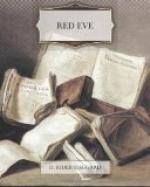“God fights for us!” said Sir Andrew with a little laugh. “This Acour’s greeting at Court may be warmer than he thinks and at the least you and Dunwich are well rid of him. Though I had sooner that you stayed here, to-morrow, daughter, you shall ride to Blythburgh. Should your father die, as I think he will ere long, it might grieve you in the after years to remember that you had bid him no farewell. If he recovers or is harsh with you it will be easy for you to seek sanctuary again.”
CHAPTER VII
THE LOVE PHILTRE
So it came about that on the morrow Eve and Sir Andrew, accompanied only by a single serving man, fearing no guile since it seemed certain that the Frenchmen were so far away, rode across the moor to Blythburgh. At the manor-house they found the drawbridge up. The watchman at the gate said also that his orders were to admit none, for the Frenchmen being gone, there were but few to guard the place.
“What, good fellow,” asked Eve, “not even the daughter of the house who has heard that her father lies so sick?”
“Ay, he lies sick, lady,” the man replied, “but such are his orders. Yet if you will bide here a while, I’ll go and learn his mind.”
So he went and returned presently, saying that Sir John commanded that his daughter was to be admitted, but that if Sir Andrew attempted to enter he should be driven back by force.
“Will you go in or will you return with me?” asked her companion of Eve.
“God’s truth!” she answered, “am I one to run away from my father, however bad his humour? I’ll go in and set my case before him, for after all he loves me in his own fashion and when he understands will, I think, relent.”
“Your heart is your best guide, daughter, and it would be an ill task for me to stand between sire and child. Enter then, for I am sure that the Saints and your own innocence will protect you from all harm. At the worst you can come or send to me for help.”
So they parted, and the bridge having been lowered, Eve walked boldly to her father’s sleeping chamber, where she was told he lay. As she approached the door she met several of the household leaving it with scared faces, who scarcely stayed to salute her. Among these were two servants of her dead brother John, men whom she had never liked, and a woman, the wife of one of them, whom she liked least of all.
Pushing open the door, which was shut behind her, she advanced toward Sir John, who was not, as she had thought, in bed, but clad in a furred robe and standing by the hearth, on which burnt a fire. He watched her come, but said no word, and the look of him frightened her somewhat.
“Father,” she said, “I heard that you were sick and alone——”
“Ay,” he broke in, “sick, very sick here,” and he laid his hand upon his heart, “where grief strikes a man. Alone, too, since you and your fellow have done my only son to death, murdered my guests, and caused them to depart from so bloody a house.”




